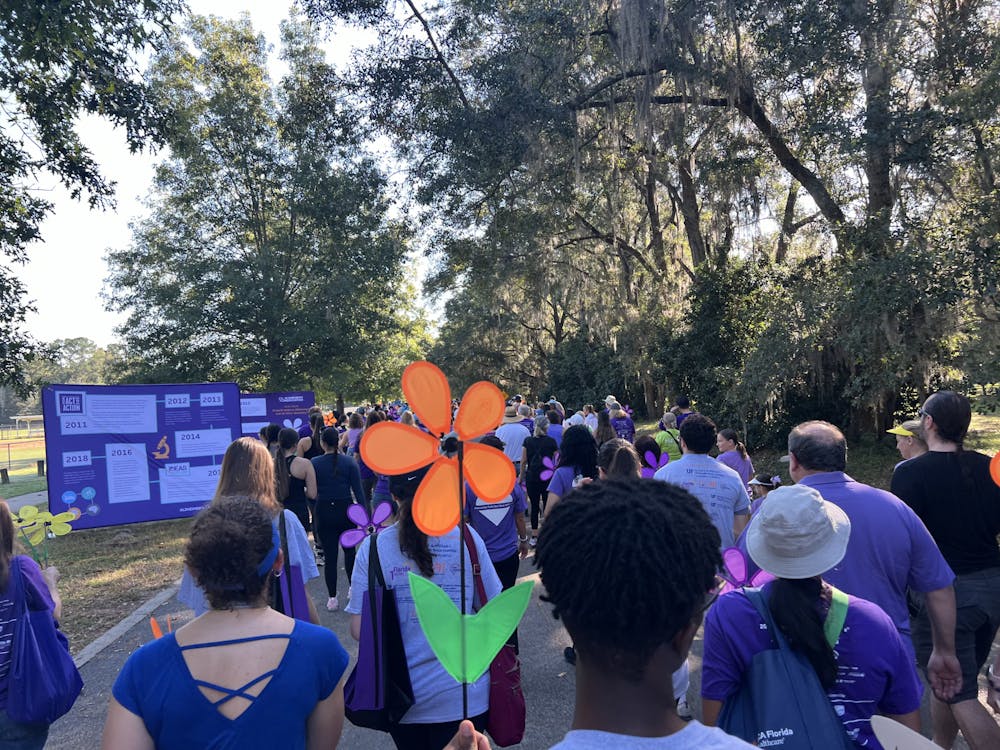Walk to End Alzheimer’s participants created a field of color as they held up orange, yellow, blue and purple flowers. Looking around at one another, they noticed dozens of people scattered around the field holding the same color flower.
The Alzheimer’s Association hosted its annual Walk to End Alzheimer’s on Saturday morning, with 756 participants walking together to show their support. The Gainesville event aimed to raise money to fund research and provide resources to those affected by the disease.
The association’s Promise Garden served as the center point of the walk, where participants gathered at Trinity United Methodist Church before setting off on their one-mile route. The Alzheimer’s Association also asked participants to make donations or set a fundraising goal when they registered individually or with a team.
According to the Alzheimer’s Association, about 11.6% of people over the age of 65 in Alachua County are living with Alzheimer’s.
Vinell Griggs, a 76-year-old who cares for her husband with Alzheimer's, has participated in the walk since 2018. Contributing $5,415 to the Alzheimer’s Association, she was announced as the walk’s top individual fundraiser, a title she has held for three years.
Griggs described fundraising as “fairly easy” because of her connections to the community. She reached out to her friends and husband’s business contacts to raise money for the event.
During the walk, the Alzheimer’s Association invited participants to carry flowers with colors representative of their relationship to the cause.
Participants carried orange flowers to show their support for the fight against Alzheimer's, yellow flowers to indicate they were caretakers to someone with the disease, purple flowers to represent losing a loved one to Alzheimer’s and blue flowers to show they were living with the neurological disorder.
Griggs walked with a yellow flower to symbolize the support she provides for her husband diagnosed with Alzheimer’s. Being a caregiver and dealing with the tasks that come with it is not easy, she said.
“A couple of previous years, he [Griggs’ husband] and I were on the stage, but he’s not able to do that anymore, so I set up a garden every year of the flowers that I’ve accumulated,” she said.
Skyler Davis, the development manager for the Walk to End Alzheimer’s in Gainesville and Tallahassee, said the promise garden ceremony is a way to find solidarity in the fight for a cure, especially for caregivers, who often struggle to find support.
“Seeing all the people raise their yellow flower in the promise garden ceremony at the same time can be really healing and empowering for those people,” Davis said.
Davis said she became involved with the Alzheimer’s Association because there was a lack of resources for caregivers and people living with Alzheimer’s. While working in healthcare, she noticed many caregivers struggled to take needed time to “step away for a second.”
Because Alzheimer’s home care is often not covered by insurance, Davis explained, relatives of those affected by cognitive disabilities often take on the role of a caregiver. Davis felt she had nowhere to direct these people until she found the Alzheimer’s Association.
“They provided all of the things that I wish I had been able to tell people when they called looking for help,” she said.
Davis said caregiving for someone with a memory disorder can be “lonely,” as the patients often cannot express gratitude for the assistance they are getting. Being a caregiver can also involve difficult decisions when it comes to the best way to support someone living with Alzheimer’s.
Many groups that offer support for families and in-house care for Alzheimer’s and dementia patients tabled at the event and gave out information to walk participants.
Sonja Weimar, a 46-year-old social worker, attended the event as a representative of HCA Florida Senior Healthcare Centers. Weimer said the work caregivers do involves striking a difficult balance between autonomy and patient safety.
Weimar often helps families make challenging decisions about caring for a family member with a cognitive disorder.
“Everybody mostly wants to live independently as long as they can until the very end,” she said. “People want to live in their own homes. And unfortunately, with Alzheimer's, that can become less and less safe.”
While caregiving is challenging, resources provided by organizations like the Alzheimer’s Association can help families find support in the face of difficult decisions. The association also raises money to fund research, like that of Eiko Alzamora, a 22-year-old UF biomedical engineering doctoral student.
“We are hoping to bring all this research to clinical trials and actually go into the market,” Alzamora said. “Currently there's only two medications for Alzheimer's, and most of them are antidepressants, and it's not really treating all the symptoms. So we want to try to stop the regression.”
As 61-year-old event chair John Tull explained, the association provides medical specialists, advocacy and support groups that can assist families and people living with Alzheimer’s.
Tull has been involved with the nonprofit for 15 years and walks for his mother-in-law Rose, who passed away from Alzheimer’s in 2017. While the walk raises money for the Alzheimer’s Association’s research, Tull views it as a way of connecting with others over a shared experience.
The association’s ultimate goal is to end the disease, according to the organization’s website. In addition to the orange, yellow, purple and blue flowers, the Promise Garden has a single white flower, representing the first person to survive Alzheimer’s.
“There's no cure,” Tull said. “They're working on it. But this walk is for all the caregivers and all the community supporters who need to know that they're not alone and there's people that can help support them.”
Contact Juliana DeFilippo at jdefillipo@alligator.org. Follow her on X @JulianaDeF58101.
Juliana DeFilippo is a first-year journalism major and general assignment Avenue reporter. In her free time, she loves to read and work on crossword puzzles.






